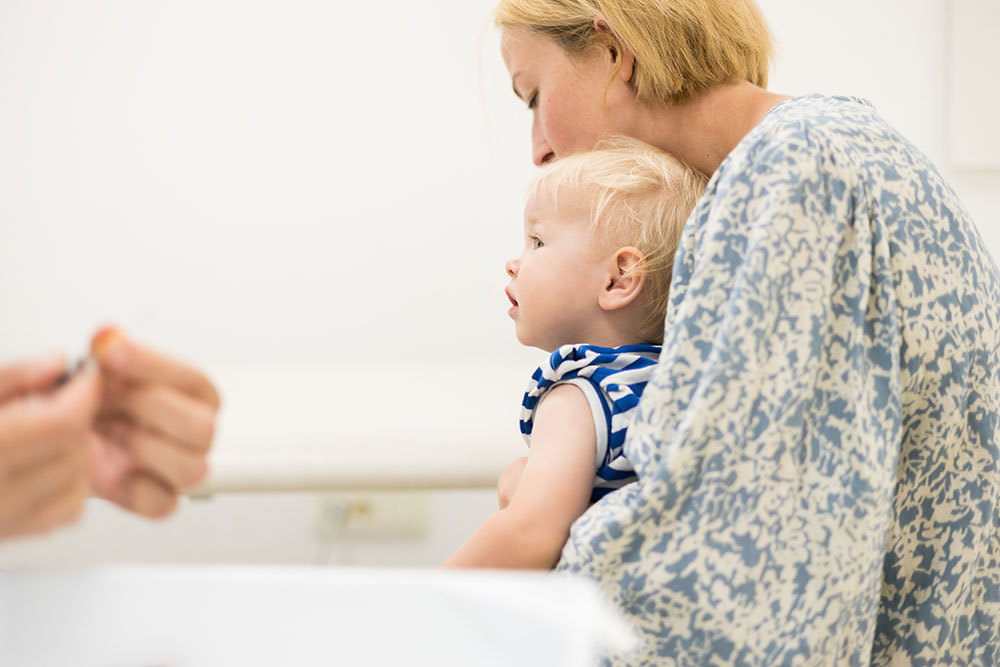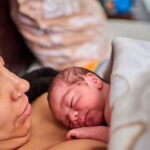RSV Vaccines for Babies and Pregnant People

Every year, up to 80,000 children under 5 years old are hospitalized for RSV—but these vaccines can help.
Respiratory syncytial virus (RSV) is an airborne respiratory virus easily spread through coughs, sneezes, direct contact (such as snuggles and kisses), and surfaces. Children and babies with RSV may experience symptoms including fever, cough, congestion, sneezing, runny nose, fussiness, and even poor feeding.
RSV is incredibly common—one of those viruses that is practically unavoidable in daycare settings—with almost every child diagnosed with it by the time they are 2 years old. However, an RSV infection can lead to bronchiolitis, a lower respiratory tract infection, and pneumonia, an infection of the lungs, both of which can result in difficulty breathing. These can lead to complications in any child—with between 50,000 to 80,000 hospitalizations in children under 5 years old annually—but are particularly dangerous for babies under 12 months old. In fact, three out of every 100 infants with RSV may require a hospital stay, according to the American Academy of Pediatrics (AAP), and the U.S. Centers for Disease Control and Prevention (CDC) estimates that every year between 100 to 500 deaths in children under 5 years old are associated with the virus.
Like most contagious viruses, there is no treatment for RSV. But, in July of this year, the U.S. Food and Drug Administration (FDA) approved the new vaccine Beyfortus for babies and toddlers under 2 years old, and then, in August, approved the vaccine Abrysvo for pregnant people. With RSV season lasting from September through May (peaking from December through February), these immunizations’ approvals came just in time to protect our littlest and most vulnerable ones from this extremely contagious virus.
What Is the RSV Vaccine?
Beyfortus is the brand name for nirsevimab and is manufactured by AstraZeneca. The FDA states it is “a monoclonal antibody with activity against RSV. Monoclonal antibodies are laboratory-made proteins that mimic the immune system’s ability to fight harmful pathogens such as viruses.” Nirsevimab is administered through injection (a shot) and is meant for babies and toddlers under 24 months old. In August, the AAP issued a press release recommending the vaccine for all infants—especially those with the highest risk of severe RSV, including babies born prematurely or with a significant congenital heart disease. According to AstraZeneca, Beyfortus is set to be widely available in the U.S. ahead of the 2023-2024 RSV season.
Abrysvo is manufactured by Pfizer and is made for pregnant people who are between 32 and 36 weeks gestation. Even though this vaccine is administered to the parent, it is meant to protect their newborns through their first 6 months of life (though it was also approved in May for at-risk older adults over 60).
How Many Doses of the RSV Vaccine Are Needed?
For Beyfortus, the AAP recommends a single dose (shot) for babies 8 months old or younger who are born during RSV season or who are entering their first RSV season. They also recommend the single dose for children aged 8-19 months who are “at increased risk of severe RSV disease and entering their second RSV season.”
For Abrysvo, only one injection (shot) is needed. However, this must be administered between weeks 32 and 36 of pregnancy.
Because Abrysvo was approved in the last few weeks, at this time, we are still waiting for official guidance from the CDC on administration, as well as information from the CDC, AAP, and the American College of Obstetrics and Gynecology (ACOG) on how Abrysvo and Beyfortus will (or will not) work together.
What Are the Side Effects?
Like any vaccine or medication, there are side effects to consider with these new RSV protections.
Potential side effects of Beyfortus include:
- Rash
- Reactions at the injection site
Beyfortus should not be given to infants and children with allergies or hypersensitivities to any active ingredients or excipients in the vaccine (talk to your child’s pediatrician about this before agreeing to the vaccine). This vaccine may not be right for infants and children with “clinically significant bleeding disorders,” according to the FDA.
Common possible side effects of Abrysvo include:
- Pain at the injection site
- Headache
- Nausea
There are also a few less common but concerning side effects. Note that in all of these cases, clinical trials showed a slight increase in the number of pregnant people experiencing these side effects who received the active vaccine compared to those who received the placebo.
- Preeclampsia
- Low birth weight
- Jaundice (infant)
The FDA also requires Pfizer to include a warning to inform patients of an increased risk of preterm birth. In clinical trials, preterm birth occurred in 5.7% of people who received the active vaccine compared to 4.7% of people who received the placebo (which is why it’s only recommended during the 32- to 36-week gestation window). The FDA also requires Pfizer to continue conducting studies to “assess the signal of serious risk” of preterm birth and preeclampsia.
For more information on Beyfortus (nirsevimab), check out the AAP’s frequently asked questions page. The CDC is scheduled to meet on September 22, 2023, to discuss Abrysvo, so more information will likely be available then.








